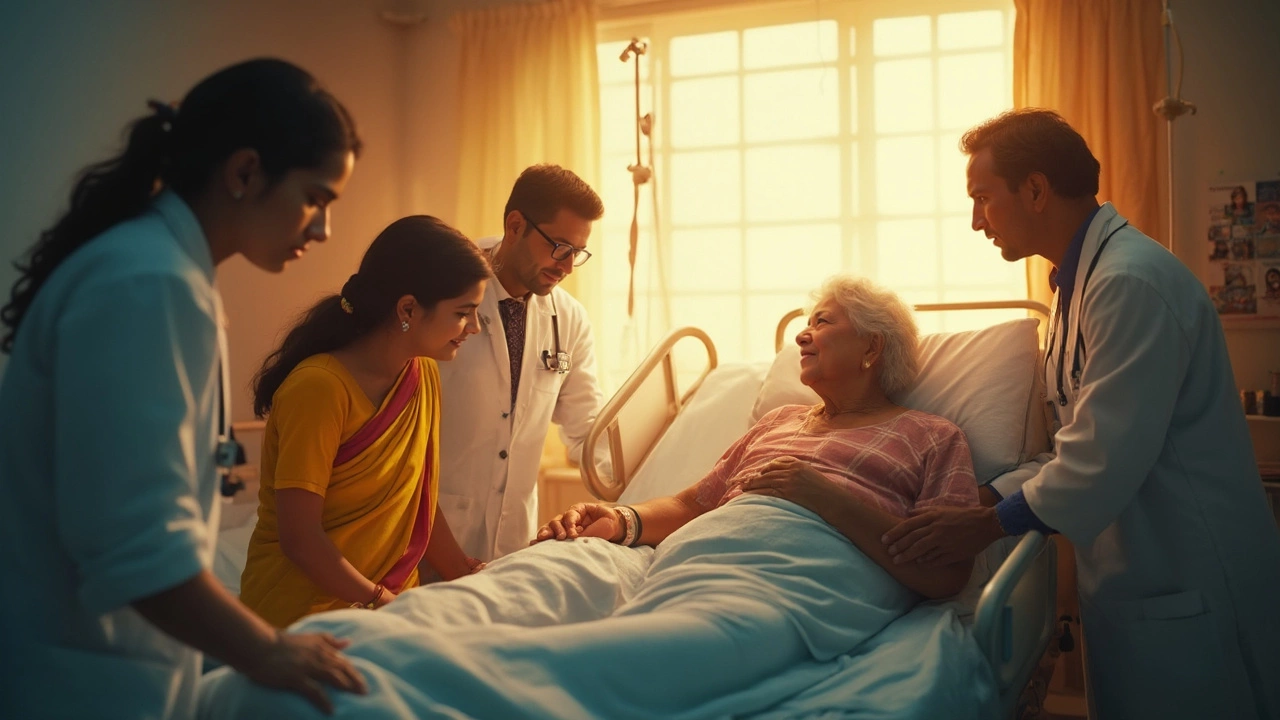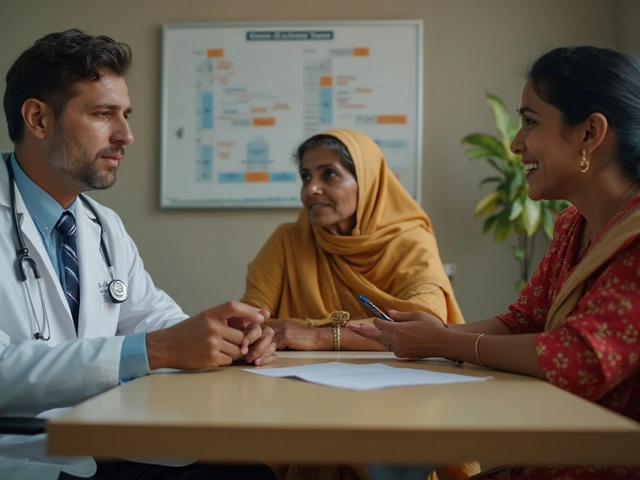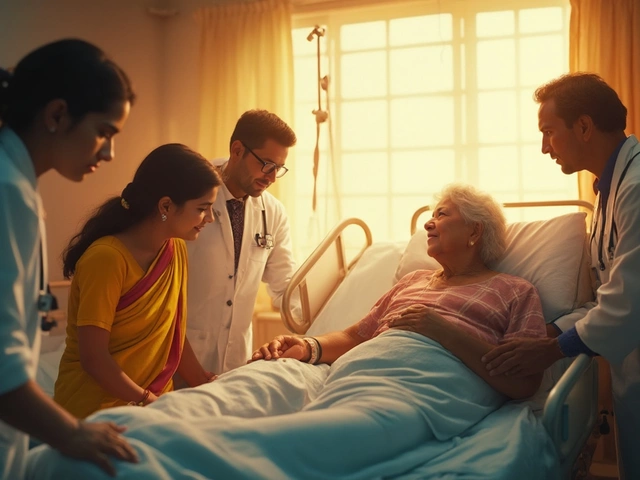
Can Stage 4 Cancer Really Be Beaten?
Stage 4 cancer is that scary term straight out of a medical drama that nobody wants to hear. It's the point where cancer has spread to other areas of the body and makes doctors and patients think about what comes next. But hold on a sec! Does this mean all hope is lost? Not quite. There are stories out there of folks who've come face-to-face with this beast and lived to tell the tale.
You might wonder, how do they do it? A mix of medical breakthroughs and sheer willpower play a big role. From revolutionary new treatments to support from friends and family, many factors contribute to these miraculous recoveries. And let's not forget the new therapies popping up like mushrooms after rain. Immunotherapy and personalized treatment plans are giving people new leases on life. Isn't that a game-changer?
Having a strong support network and keeping a positive mindset can be just as crucial. Many survivors swear by the power of mental toughness. You see, fighting cancer isn’t just about what's happening in the lab; it’s personal, emotional, and sometimes, downright grueling. So, for anyone going through this or having a loved one in the fight, there's more courage and innovation out there than you might think.
- Understanding Stage 4 Cancer
- Incredible Recovery Stories
- Advancements in Treatments
- Role of Support Systems
- Mental Strength and Positivity
- Navigating Challenges
Understanding Stage 4 Cancer
When you hear the term stage 4 cancer, it's a gut punch for sure. But let's break down what it really means. In simple terms, stage 4 is when cancer has spread far from its origin, and it's messing around in other parts of the body. This process is known as metastasis. It's like when a weed spreads seeds all over the yard, and now you've got little plants popping up where you least expect them.
Cancer treatment plans for those diagnosed at this stage are different from early stages. Instead of just focusing on shrinking the initial tumor, doctors look at attacking the cancer wherever it has spread. It’s a bit like whacking moles in a carnival game—you’ve got to hit them all or they’ll keep popping up.
How Does It Happen?
The transition to stage 4 can be influenced by the type of cancer and how aggressive it is. Some cancers are sneaky and fast-moving. For instance, pancreatic cancer is infamous for being detected late. By the time it's found, it’s often advanced, which makes it trickier to treat. On the flip side, certain cancers, like prostate cancer, can be slower, giving doctors more time to catch them before they go haywire.
Treatment Goals
With stage 4 cancer, it’s all about control and quality of life. The aim is to slow the disease, manage symptoms, and improve the patient's time doing what they love. This stage isn’t typically about a cure, but there are cases where people go into remission or live much longer than expected. Thanks to new cancer recovery treatments coming out, options are better than they’ve ever been before.
Statistics and Hope
The survival rates vary depending on many factors, including cancer type and treatment advancements. For instance, the five-year relative survival rate for stage 4 breast cancer is around 28% according to recent studies. Though these numbers might feel daunting, remember every individual is unique and statistics don’t decide personal stories.
Here's a quick peek at some survival estimates:
| Cancer Type | 5-Year Survival Rate (Stage 4) |
|---|---|
| Breast Cancer | 28% |
| Colorectal Cancer | 15% |
| Melanoma | 23% |
So, what's the takeaway? While stage 4 isn't where anyone wants to be, understanding the landscape and knowing that treatment options are evolving every day, gives a glimmer of hope. Being informed can lighten the load, even just a little bit.
Incredible Recovery Stories
When you hear the words stage 4 cancer, you might think it's the end of the road, but wait until you hear about some folks who defied the odds. These aren't just outliers; they're real people whose determination and access to new treatments led to unexpected recoveries.
Maria's Triumph Over Lung Cancer
Maria Gonzalez, a retiree from Texas, was diagnosed with stage 4 lung cancer. It had spread to her bones, but she wasn't ready to give up. After traditional chemotherapy didn't do the trick, Maria enrolled in a clinical trial for a new immunotherapy drug. She not only responded well but achieved remission. Two years later, she still enjoys her morning walks and cherishes every moment with her family. Her story has inspired many in her community and beyond.
John Beats Colorectal Cancer
Then there's John Patel, a software engineer from California, who refused to let a stage 4 colorectal cancer diagnosis stop him from living life to the fullest. With advanced personalized treatment plans, his doctors tailored a regimen that worked in harmony with his unique genetic makeup. John attributes his recovery not only to science but also to his determination to stay positive. Nowadays, he mentors other patients undergoing similar battles, spreading hope and courage.
Miracles in Numbers
Feeling motivated yet? Here's a table that shows how some of the latest treatments have impacted survival rates:
| Treatment Type | Average Extended Survival (Years) |
|---|---|
| Traditional Chemotherapy | 1-2 |
| Targeted Therapy | 3-4 |
| Immunotherapy | 5+ |
These stories remind us it's not just about the fight, but about finding the right tools to win it. Of course, while not every story ends in remission, they underline the progress in cancer treatment. They show what's possible with a combination of cutting-edge science and that never-give-up attitude.
Advancements in Treatments
Life doesn’t stop with a stage 4 cancer diagnosis, and that's partly due to some mind-blowing advancements in medical science. Let's dive into what's making waves in treatment options.
Personalized Medicine
Not so long ago, getting a cancer treatment felt like a one-size-fits-all scenario, but the game has changed with personalized medicine. Imagine getting a treatment tailored just for you, based on your unique genetic makeup. Pretty cool, right? By examining a patient's DNA, doctors can predict how the body will respond to different treatments, cutting out the guesswork.
Immunotherapy
Another rockstar in cancer treatment is immunotherapy. This isn't as sci-fi as it sounds; it's all about boosting the body's natural defenses to fight cancer. Think of it as equipping your body's army with better weapons. Some patients with stage 4 cancer have responded remarkably well to this treatment, shaking off tumors that wouldn't budge otherwise.
Targeted Therapy
Then there's targeted therapy, which is sort of like having a GPS for fighting cancer. Unlike traditional chemotherapy, which can hit healthy cells too, targeted therapy zeros in on specific cancer cells. This means fewer side effects, allowing patients to feel more like themselves while battling the disease.
Data on New Treatments
With all these new options, it's also key to be aware of their effectiveness. Here's a quick look at how patients are doing globally with some of these treatments:
| Treatment Type | Global Improved Survival Rate (%) |
|---|---|
| Personalized Medicine | 60% |
| Immunotherapy | 50% |
| Targeted Therapy | 45% |
This table gives us a rough idea of the positive impact these treatments are having. While these numbers offer hope, always keep in mind that every individual's journey is unique.
These are just a few of the heavy-hitters in the world of cancer treatment, constantly evolving as research continues to break new ground. It's a ray of hope for many battling stage 4 cancer, showing that life can indeed turn around when science and determination meet.

Role of Support Systems
When hit with a stage 4 cancer diagnosis, it's easy to feel like you're standing alone in the storm. But creating a strong support system can be a lifesaver—quite literally. Family, friends, and even community support groups can make a huge difference in dealing with the daily grind of treatment and illness.
So, why is a support network so crucial? Well, it's not just about moral support; it's about practical help too. Folks who have a team by their side often find it easier to juggle hospital visits, medication schedules, and still manage a sense of normalcy.
Emotional and Practical Support
Living with cancer is emotionally exhausting, and sometimes, just having someone to talk to can make all the difference. Your loved ones can help you process all the medical jargon and even just lend a shoulder to cry on. Plus, don’t underestimate the power of someone running errands or helping out with chores at home. It's the little things that add up.
Building Your Team
A well-rounded support network often includes a mix of family, friends, and healthcare providers. Many people also find strength in meeting others who are in similar situations. Cancer support groups provide that sense of community and understanding that you sometimes can’t get from anyone else. If you’re feeling hesitant, remember, these groups have been shown to improve quality of life for many patients.
Navigating Online Communities
The internet opens up a world of support right at your fingertips. Online forums and social media groups can offer comfort without even leaving home. They’re great for connecting with other survivors and sharing stories, tips, and encouragement, making the journey a bit less lonely. Be mindful though, not all advice fits all, so it's important to discuss any new ideas with your medical team.
In short, a support system can ease the load, bring hope, and remind you that you are never alone on this journey. It makes riding out the tough days a lot more manageable, whether through words of encouragement or someone showing up with a home-cooked meal. When battling cancer, every bit of love and care counts miles.
Mental Strength and Positivity
Alright, let’s talk about the power of the mind when it comes to battling stage 4 cancer. It might sound cliché, but your mental outlook can seriously affect how you cope with the challenges this disease throws your way. It’s not just about putting on a brave face; it's about finding resilience deep within yourself.
Why Positivity Matters
Research has shown that people who maintain a positive attitude often have better health outcomes. They are more likely to stick to treatment plans and engage with their healthcare providers proactively. Positivity can boost your immune system, not magically curing cancer, but certainly making your body more resilient to tackle treatments.
Tips for Staying Mentally Strong
- Meditation and Mindfulness: Practicing mindful meditation can reduce stress and increase your sense of well-being. It’s about staying present and focusing on what you can control.
- Support Networks: Surrounding yourself with family, friends, or support groups can provide a morale boost. Sometimes, just having someone to talk to who gets it can make a world of a difference.
- Goal Setting: Setting small, achievable goals can give you a sense of accomplishment and something to strive for beyond your cancer diagnosis.
Real World Impact
A study from Johns Hopkins even noted that patients who engaged in regular exercise reported higher quality of life scores than those who didn’t. Keeping your spirits up isn’t just about mental tricks but sometimes it’s as straightforward as going for a walk.
Yeah, staying positive sounds nice, but it’s not always easy. What matters is making sure you’re taking care of your mind just as much as your body during treatment. By combining the power of positivity with modern cancer treatment advancements, you're not just waiting to live; you're living.
Navigating Challenges
Facing stage 4 cancer is like preparing for the fight of your life, but it's not all gloom and doom. People go through a whirlwind of emotions and obstacles, but with the right approach, these challenges can be tackled head-on.
Understanding the Medical Maze
Dealing with complex treatments is one of the main hurdles. It's like stepping into a foreign land with doctors talking in scientific lingo. Learn what's involved in your treatment plan, including chemotherapy, radiation, or emerging options like immunotherapy. Having this knowledge helps in making informed decisions.
The Financial Side
Let's be real—cancer treatment isn't cheap. Many face massive medical bills, and it gets overwhelming. Look into insurance options and financial aid available through various organizations. It might surprise you how much help is out there if you're willing to do a little digging.
Building a Support Network
Here's where your squad comes in. Navigating this journey is much easier when you have loved ones by your side. Whether it's driving you to appointments or simply providing emotional support, don't shy away from leaning on family and friends.
Emotional and Mental Well-being
Mental battles are as significant as physical ones. Many cancer survivors emphasize the importance of staying upbeat and using positive affirmations to cope with stress. Therapy, meditation, or support groups can be life-savers, providing emotional outlets and connections with others facing similar challenges.
Here's a little bit of perspective:
| Type of Support | Percentage of Impact |
|---|---|
| Family and Friends | 40% |
| Mental Health Resources | 30% |
| Financial Counseling | 20% |
| Spiritual/Religious Support | 10% |
This shows how these supports stack up and contribute to handling this disease's stress.
Staying Organized
Managing numerous appointments, medications, and daily routines can seem like juggling flaming balls. Keep track of everything using digital apps or good ol' notebooks—whatever works for you. This organization keeps you on track and lets you focus on what really matters: your health.
Tackling stage 4 cancer isn't a walk in the park, but with a little preparation and support, those hurdles can be turned from overwhelming challenges into manageable tasks.

Arnav Singh
I am a health expert with a focus on medicine-related topics in India. My work involves researching and writing articles that aim to inform and educate readers about health and wellness practices. I enjoy exploring the intersections of traditional and modern medicine and how they impact healthcare in the Indian context. Writing for various health magazines and platforms allows me to share my insights with a wider audience.
About
Medical Resource Center India is a comprehensive online platform dedicated to providing reliable health information and medical resources in India. Explore a wide range of articles, tips, and advice on medicine, healthcare services, and wellness. Stay informed about the latest developments in Indian medicine and access valuable insights into maintaining a healthy lifestyle. Discover expert guidance and health solutions tailored for every Indian citizen. Your go-to destination for authoritative medical knowledge in India.






